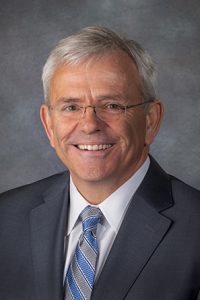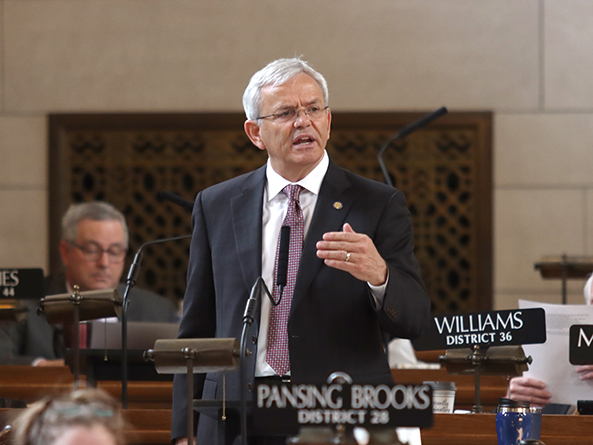Criminal justice reform measure stalls on first round
A bill that would enact a series of measures intended to reduce Nebraska’s inmate population and lower recidivism rates stalled April 6 after a failed cloture motion.

LB920, introduced by Omaha Sen. Steve Lathrop, chairperson of the Judiciary Committee, would enact a number of provisions intended to improve Nebraska’s criminal justice system.
Provisions of the bill are based on recommendations from the Criminal Justice Reinvestment Working Group, Lathrop said, and offer potential reforms to address the state’s prison overcrowding crisis in the face of efforts to construct a new, 1,500-bed prison at a cost of $270 million.
The working group included members from all three branches of government who examined data on Nebraska’s criminal justice system analyzed by the national Crime and Justice Institute. The group offered a series of recommendations for reform.
LB920 contains a number of those provisions designed to address sentencing, reentry, release and supervision, including:
• requiring each judicial district to establish a problem-solving court;
• reducing potential penalties for some drug and burglary offenses;
• creating three probation system pilot programs;
• limiting mandatory minimum terms for certain nonviolent felonies;
• limiting offenses that can be used for certain sentence enhancements;
• limiting when courts may impose consecutive sentences;
• providing for geriatric parole, streamlined parole and earlier parole eligibility for some inmates; and
• creating a residential housing program for parolees who commit technical violations.
A Judiciary Committee amendment would, among other provisions, increase the age requirement for geriatric parole eligibility from age 70 to 75 and increase the sentence length eligibility from 10 years to 15.
Lathrop said that even if the state were to close the existing state penitentiary and build additional capacity, the correctional system would remain in an overcrowding emergency without sentencing reform, falling 1,300 beds short of needed capacity by 2030.
The underlying problem, he said, is the rate at which the prison population is growing, in part as a result of “jam outs” — when an inmate completes their maximum sentence without having been released on supervised parole.
Ninety-five percent of inmates eventually will be released, Lathrop said, and they need incentives to encourage their participation in programming that will earn them a chance at parole. The only way to reduce jam outs and increase former inmates’ chances at successful re-entry is to improve parole eligibility opportunities, he said.
“That’s what LB920 does,” Lathrop said. “That’s what makes the difference in [the] rate at which our population will grow between now and 2030 and indefinitely.”
Gering Sen. John Stinner agreed. In 2014, Nebraska’s prisons were at 150 to 160 percent capacity, he said, yet despite the construction of hundreds of new beds since then, the population currently is at 155 percent capacity. At that continued rate, he said, the state would need to construct several more prisons in the next 20 years just to keep up.
“The fact of the matter is, we’re under an emergency [overcrowding] declaration. We’re the worst in the country and all we can do is talk about building a new prison,” Stinner said. “We talk about safety and keeping the public safe, but how about the workers and the inmates? This isn’t soft on crime. These are reforms that were put [in place] in other states.”
Omaha Sen. John Cavanaugh spoke in support of LB920 and the committee amendment. The state should reduce penalties for certain first-time offenses, he said, including burglary of a building that isn’t an occupied dwelling and possession of small amounts of drugs. Doing so would correct existing sentencing disparities that don’t reflect the harm that a crime poses to society, he said.
“Having less than half a gram of methamphetamine is not the type of conduct that we think someone should go to prison for and our laws should reflect that,” Cavanaugh said.
Also in support of the proposal was Bennington Sen. Wendy DeBoer. She said jam outs are dangerous to communities and that the only way to reduce bad outcomes is for inmates to go through the parole system and learn how to successfully re-enter society.
“We have to find a way to incentivize them and then help them get back in the community safely,” she said. “[Moving up] the parole eligibility date does not mean anyone will get out a day sooner than under current law unless the parole board says they are ready. When they get out, they are supervised until their jam-out date.”
Lincoln Sen. Suzanne Geist said 80 percent of the provisions in LB920 are “consensus items” that deal with rehabilitation and that nearly everyone in the Legislature agrees upon. She offered an amendment that she said would remove the other 20 percent of the bill’s “non-consensus” items, which she said are a threat to public safety.
The amendment would remove provisions that would reduce prison sentences and lower penalties for certain felonies such as possession of small amounts of controlled substances and burglary that doesn’t involve an occupied dwelling. It also would remove a requirement that an individual have committed violent offenses previously to be sentenced as a habitual criminal.
“We all agree that we want to prevent jam outs, but we have a different philosophy on how to get there,” Geist said. “Rehabilitation is a large part of what I think is important and something we as a state have rarely focused on, if ever, exclusive of lowering penalties and changing sentences. In my opinion, those cost nothing — except public safety.”
Instead of changing sentencing and penalties, Geist said, the state should focus its efforts on helping inmates get better at a time when the state has an inflow of money. Better means not returning to prison, she said.
“I disagree with changing the penalty for [possession of] a small amount of drugs. That can [indicate] a very serious problem and we want to address it on the front-end as soon as we possibly can so that it can be taken care of,” she said. “Treatment can be the very best thing, even if it’s forced treatment.”
Sterling Sen. Julie Slama spoke in support of the Geist amendment, calling it “responsible governance” that would maintain public safety. LB920 as introduced would go too far, she said, and the Geist amendment would address important issues like jam outs and access to mental health care without endangering the public.
“We’re in the top 15 for the lowest imprisonment rate in the country,” Slama said. “We don’t need to free felons and tie the hands of our justice system in doing so.”
Lathrop opposed the Geist amendment, which he said would remove all of the provisions from LB920 that could “move the needle” and slow the predicted upward climb in the state’s prison population. Sentencing reform is essential to that equation, he said.
Sen. Terrell McKinney of Omaha also opposed the Geist amendment. He said Nebraska has the 10th highest Black incarceration rate in the country, and that the low incarceration rate cited by Slama only applies to white Nebraskans. People’s lives are at stake, he said, and LB920 is a moderate approach to reforming the criminal justice system.
McKinney said he would rather the Legislature take no action this session than adopt the Geist amendment, which he said would not result in meaningful change.
Sen. Anna Wishart of Lincoln also spoke in opposition to the Geist amendment, saying it wouldn’t go far enough in reducing Nebraska’s inmate population. At the current rate of growth, she said, the state would need to build two prisons over the next 20 years at a cost of at least $1 billion.
“We need to pass the full package,” Wishart said. “We need to be smart in how we invest in public safety. LB920, with the whole package, is that.”
After eight hours of debate over three days, Lathrop filed a motion to invoke cloture, which ends debate and forces a vote on the bill and any pending amendments. The motion failed on a vote of 26-18. Thirty-three votes were needed. LB920 is unlikely to be placed on the agenda again this session.


